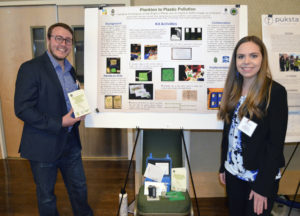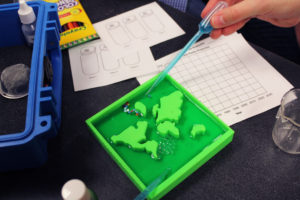The earth’s oceans have a lot of plastic in them, and this comes as a surprise to few people.
Recent pushes to reduce single-use plastics – discontinuing plastic straws, banning plastic grocery bags, using reusable water bottles – are designed to help alleviate this problem. But what happens when plastic does end up in the ocean?
Two Colorado State University students have developed an educational tool to help K-12 students around the world understand the answer to this question. Andrew Allsup (Natural Sciences, ’19), and Zoë Tauxe (Psychology, ’19), designed a Plankton to Plastic Pollution kit to teach kids about how plastic impacts oceans and their ecosystems.
Sparking curiosity
The kit, which started as an online resource for teachers, quickly evolved into an entire kit – one of many STEM education kits developed by the Education and Outreach Center. It covers an array of topics from bioaccumulation to currents and circulation.
The kit comes with tools for various experiments and activities as well as a guidebook that can be adapted for any level of learning. The goal is to spark questions that can be answered through activities and research as well as teach children about the steps they can take to reduce the amount of plastic in the ocean.
“What makes this kit important is that it’s so applicable,” Tauxe said. “We always hear about not using plastics, but we don’t know why or how. This provides a tool for kids to start hearing and learning about what happens to plastic when it does reach the ocean.”
Global learning for a global issue

With ocean plastics having such wide-reaching effects around the world, Allsup and Tauxe saw an opportunity to collaborate with Semester at Sea to send the kit around the world.
“It can really reach so many people,” Allsup said. “It’s relevant, adaptable, and can be applied to global environmental systems.”
“The kits have an excellent Spanish guide to the activities to accompany the English guide,” said Christy Fitzpatrick, an extension agent in Chaffee County, Colorado. “Our Spanish teacher at the Todos Santos Center did the translation so it matches actual Spanish instead of the word for word translations we sometimes run into.”
The kits have also been used at the CSU Todos Santos Center, where field classes are taking it into communities that are directly impacted by ocean plastics.
“The plastics kit was greatly appreciated by the students and teachers from the local schools in Todos Santos,” said Aines Castro Prieto, director of the CSU Center in Todos Santos. “We enjoyed very much facilitating the workshop. We are looking forward to extending the Oceans and Plastics workshop to other schools/students in the community.”
If you’d like to learn more, Allsup and Tauxe will be hosting an Earth Week Event on April 24 at 1 p.m.